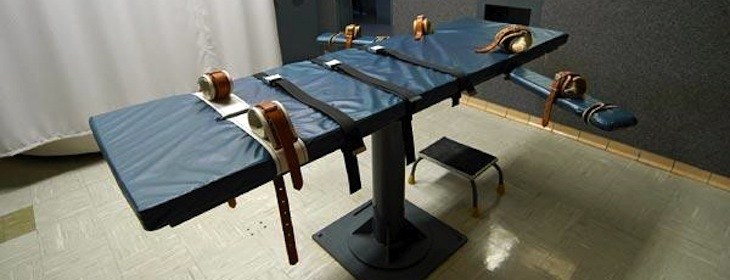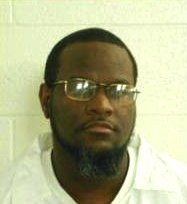Kenneth Williams executed, fourth Arkansas inmate to die in April by lethal injection
by April 27, 2017 11:31 pm 1,549 views

Pleas for mercy from the family of one of his victims to Gov. Asa Hutchinson wasn’t enough to stop Thursday’s (April 27) execution of death row inmate Kenneth Williams.
The lethal injection process began at 10:52 p.m. and he was pronounced dead at 11:05 p.m. However, media witnesses said he experienced twenty seconds of “coughing, convulsing, lurching, jerking with sound” when the midzalom injection was applied. Midzalom is the first drug used in the three-drug execution protocol. A spokesman for the Arkansas Department of Corrections described Williams as “shaking” for about ten seconds during the process.
Earlier Thursday, attorneys for Williams sought several reprieves with state and federal courts asking that the Arkansas Parole Board give Kayla Greenwood, the daughter of victim Michael Greenwood, and Stacey Yaw, the widow, “an opportunity to testify at the Arkansas Parole Board in support of Mr. Williams’s clemency.” The reprieves also asked the Parole Board to review evidence that Williams is intellectually disabled and ineligible for the death penalty.
“On October 4th 1999 I became a widow and a single mother of three. I was 6 months pregnant with twins and had a five year old daughter,” Yaw noted in a letter delivered to Gov. Hutchinson. “Parenting up to that point had been a fun joyful experience but after the day my husband was killed it became the biggest challenge I would ever face. I was left with a broken-hearted five year old girl that had been traumatized and it changed the course of our life forever.”
Gov. Hutchinson earlier this year set execution dates two at a time over an 11-day period starting April 17 and ending April 27.
• April 17: Don Davis, Bruce Ward;
• April 20: Stacey Johnson, Ledelle Lee;
• April 24: Marcel Williams, Jack Jones; and
• April 27: Jason McGehee, Kenneth Williams.
However, in separate legal actions, stays of executions were granted for Davis, Ward, Johnson and McGehee. Lee was executed Thursday (April 20). Marcel Williams and Jones were executed April 24, marking the first time since 2000 a state executed two inmates in one day.
REQUEST TO AVOID ‘ADDITIONAL SUFFERING’
According to the attorney for Kenneth Williams, Kayla Greenwood was not notified of Williams’ recent clemency hearing.
“In her letter, Ms. Greenwood explained that if she had known about Mr. Williams request for clemency, her family would have requested to testify at the hearing on behalf of Mr. Williams and would have asked the board to grant clemency,” noted a statement from the attorneys. “While acknowledging that Mr. Williams’ actions from nearly twenty years ago caused her family considerable pain, she believes that executing Mr. Williams would only cause them ‘additional suffering.’”
Also on Thursday, the Arkansas Coalition to Abolish the Death Penalty, ACLU, ACLU-Arkansas, Amnesty International, EJUSA, and the Catholic Mobilizing Network delivered petitions from “nearly 250,000 people from Arkansas and across the United States” who asked “Governor Asa Hutchinson to suspend executions and stay tonight’s scheduled execution of Kenneth Williams.”

Gov. Hutchinson issued this statement in response to the letter from the Greenwood family letter: “I have reviewed the letter from the Greenwood family, and I appreciate the genuine spirit of forgiveness and compassion demonstrated by Ms. Greenwood. Her letter certainly has an impact, however my responsibility is to look at the totality of the case including the view of all the victims and the interest of justice. Kenneth Williams murdered multiple people, and actions have consequences. Kenneth Williams murdered 19-year-old Nikki Hurd and was charged with capital murder. Williams was then spared the death penalty by the jury who gave him life in prison without the possibility of parole. Despite this showing of mercy, Kenneth Williams determined to escape from prison. After 18 days in prison, he escaped and took human life again with the killing of Cecil Boren. These facts support the final verdict of the second jury in giving the death penalty.”
KENNETH WILLIAMS’ VICTIMS
Genie Boren knew something was terribly wrong. She returned to her Grady-area home, and the place was ransacked. Guns were missing, and so was her 57-year-old husband, Cecil who had been working in the garden when she left.
Panicked, she called neighbor Kay McLemore. The two began to search. They found Cecil facedown in a nearby bayou. The beloved father and husband had been shot seven times and wasn’t wearing socks or shoes. No one knows if he begged for mercy, or attempted to fight his attacker. Scrape marks on his body indicated he had been dragged to the spot. A pool of blood near the home meant he was shot there. His killer, escaped convicted murderer Kenneth Williams, took the man’s clothes, money, guns, rings, and truck after he stole Cecil’s life.
Williams was apprehended one day after the killing, on Oct. 4, 1999. He was reportedly wearing his victim’s clothes. A year later he was convicted of capital murder and sentenced to death.
Williams took the man’s truck and headed north. In Missouri, he got into a high speed chase with law officers. During the chase that spanned almost 60 miles starting in Lebanon, Mo., Williams drove at speeds more than 120 miles per hour. He struck another vehicle, killing the driver, Michael Greenwood. After police arrested him following a short pursuit on foot, Williams reportedly spat at Greenwood’s body and blamed him for his failed escape attempt. He was wearing two of Cecil Boren’s rings when he was arrested.
Williams’ journey to the state’s Death Row began less than a year before his encounter with Cecil Boren. Williams approached two college students, Peter Robertson and Dominique Hurd, a cheerleader at the University of Arkansas at Pine Bluff, in a restaurant parking lot Dec. 13, 1998 in Pine Bluff. He brandished a gun and kidnapped them. He directed the couple to an ATM machine where he stole $70 from Robertson’s account.
He ordered them to drive down several dead-end streets. At one point he told the couple to exit the car, and forced Robertson to take pictures of Hurd after Williams removed her underwear. They drove down another dead-end street and he ordered them to climb a fence and kneel behind a shed. He was about to drive away when he stopped and opened fire on the couple. Hurd was killed.
WILLIAMS’ EXECUTION
Just a few minutes prior to his planned 7 p.m. execution, the U.S. Supreme Court asked Gov. Hutchinson and Arkansas Attorney General Leslie Rutledge to review Williams’ case.
That request came after numerous appeals by Williams’ attorneys were denied by the Pulaski County Circuit Court, the Arkansas Supreme Court, the U.S. District Court for the Eastern District of Arkansas, and the U.S. Eighth Circuit Court of Appeals.
U.S. District Judge D.P. Marshall, with the Eastern District of Arkansas, said a lack of clemency hearing notice to the Greenwood family did not violate due process rules.
“Williams is unlikely to prevail on his new argument about lack of notice to the Greenwood family. The Parole Board didn’t stumble by not notifying the Greenwoods about Williams’s clemency hearing,” Marshall noted in the ruling. “Williams is right that Greenwood’s death in the traffic accident was in the mix. A perfect statute would require notice to all the victims, and affected family members, of a clemency applicant. This one, though, only requires notice to the victim or family of ‘the crime’ that resulted in the sentence on which the prisoner is seeking mercy.”
Late Thursday night, the legal delays ended and Williams was put to death.
Gov. Hutchinson issued this statement after the execution: “The long path of justice ended tonight and Arkansans can reflect on the last two weeks with confidence that our system of laws in this state has worked. Carrying out the penalty of the jury in the Kenneth Williams case was necessary. There has never been a question of guilt.
“In 1999, Williams was serving a life sentence for the murder of 19-year-old Nikki Hurd when he escaped and proceeded to kill again: 57-year-old Cecil Boren, a grandfather and husband to Genie, and a Missouri man, 24-year-old Michael Greenwood. Williams would later confess to the unsolved murder of 36-year-old Jerrell Jenkins, a father and stepfather.
“In the last seven days, after decades of waiting, the families of Debra Reese, Christine Lewis, Mary Phillips, Lorraine Anne Barrett, Stacy Errickson, Nikki Hurd, Jerrell Jenkins and Cecil Boren were finally provided the justice they were promised and they also saw that our system of laws have meaning.”
